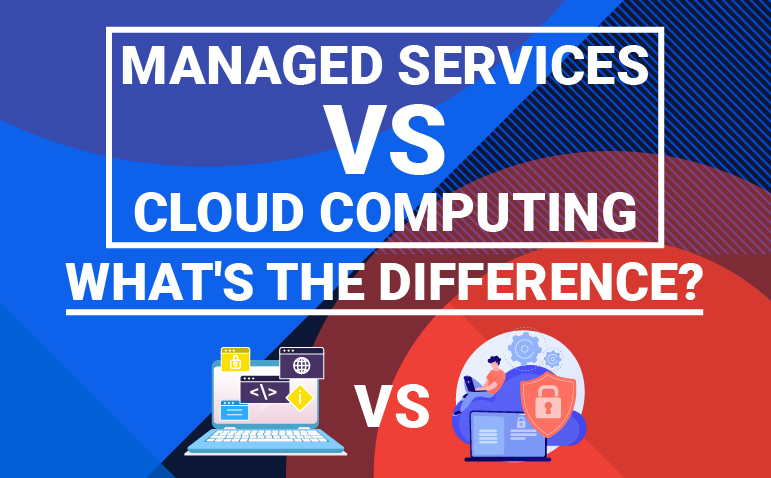Let’s say you work as an employee or the CIO of a business. In that situation, it’s likely that you will have to deal with two conflicting forces at some point in the future: on the one hand, the needs of your company and the growing need for agility, and on the other, your team’s inability to effectively manage everything in the digital world. Having a managed services contract, which reduces some load on your technical department by allowing them to employ third-party organizations instead of managing services themselves, or fully embracing cloud computing are frequently the two options that result from these two considerations.
Businesses may streamline operations, automate procedures, and make data-driven choices with the use of Managed services and cloud computing. Additionally, they share a number of characteristics that make it simpler to comprehend how managed services and cloud computing differ from one another. Cloud computing and managed services are two prevalent methods that businesses outsource their IT requirements. Managed services, which include data management systems and IT infrastructure management, refer to the outsourcing of regular technological management. However, cloud computing is the practice of securely storing and accessing data through cloud-based services.
Knowing what these services are and how they might help your business is crucial whether you’re trying to save costs or establish an online presence. Continue reading to find out more about how managed services and cloud computing compare and contrast.
What is a Managed Service?
Managed services are a sort of outsourcing where a business owns the technology and personnel of another business but not the operational procedures or the clientele. A service level agreement (SLA)-based managed service provider (MSP) provides clients with a range of managed services. The level of service that is anticipated is described in this agreement, together with measurements for performance and response times.
Data management is a typical managed service type. Customer data must be stored, retrieved, and secured in this process. Information technology services, which involve managing an organization’s technological infrastructure, such as servers, networks, and software applications, are another category of managed service.
Data management, cloud computing, migration, and information technology services are just a few of the managed services that Protected Harbor provides to its clients. We collaborate with our clients to create personalized SLAs that address their unique needs and provide them peace of mind knowing that their data and technology are safe.
For their managed services requirements, businesses engage with us for a variety of reasons. Our proficiency in data management, which aids clients in enhancing their data security and compliance, is one of the key causes. Additionally, we provide a range of managed services, such as cloud-based solutions, to give our clients the adaptability and scalability they require as their companies expand.
For instance, a hosting company may contract with a different business to maintain its infrastructure. The website of the client is hosted on the managed service provider’s cloud. The ordered service provider has managed the hosting for the customer for a fee.
What is Cloud Computing?
The distribution of resources and services via a network of shared hardware and software that is housed on remote servers and is accessed through a network is known as cloud computing. This means that you access technology through the Internet cloud rather than owning or managing it. For instance, you don’t need to be familiar with the technical details of the computer to utilize a shared spreadsheet on someone else’s computer through the Internet.
Another name for it is “virtual computing.” A cloud service provider like Amazon provides a range of software, processing, and storage options. Utilizing a cloud service provider has the benefit of allowing you to outsource time-consuming activities to a third party, such as maintaining the technical setup of employees’ computers.
Advantages of Cloud Computing
Cloud providers offer several advantages over managed services providers. First, you get access to a broader range of services and benefits, like automatic backup and disaster recovery. The second is that you don’t have the costs associated with data center maintenance or power. Another advantage of cloud computing is that you are not limited to using the technology of a single provider since the cloud is an open network where anyone can offer a service. This means you can access a broader range of technologies and services without being limited to the ones a managed service provider offers.
Comparing cloud service providers to managed services providers, there are various benefits. First, a wider choice of services and advantages are available to you, including automatic backup and disaster recovery. The second is that you avoid paying for power or upkeep of data centers. Because the cloud is an open network where anybody can provide a service, another benefit of using cloud computing is that you are not restricted to using the technology of a single supplier. As a result, you are no longer restricted to the technology and services that a managed service provider provides.
Managed Services vs. Cloud Computing
Cloud computing and managed services are advantageous to businesses wishing to boost their technological capabilities. Organizations can gain from managed services by having their IT infrastructure expertly monitored and managed. They can also gain from data management methods that can enable them to gain useful insights from the data they collect. Organizations can gain from scalable, affordable solutions that enable them to access their data from any location with cloud computing.
Managed services can assist firms in utilizing business analytics and machine learning to make smart business decisions. Cloud computing can likewise offer the adaptability and scalability required to assist development and innovation. Both strategies can provide high data governance and security, which is essential for businesses that deal with sensitive data.
The decision between managed services and cloud computing will ultimately come down to the particular requirements and objectives of an enterprise. Managed services could be a preferable option for businesses that need more control over their technological infrastructure. Cloud-based solutions can be the best option for businesses seeking greater adaptability and scalability. In order to maximize the return on their technological investments, businesses should look for a provider who delivers high levels of support, data integration, and data warehousing.
Managed vs. Platform as a Service
Compared to cloud computing, managed services often have a smaller scope and a more narrowly defined goal. Instead of replacing current IT service delivery, they are frequently utilized to enhance it. A managed service often has a set scope and time frame. The range comprises the kind of service provided and the amount of work needed to provide it. Typically, the length of the contract is less than its scope. You can utilize an Application Programming Interface (API) provided by a platform as a service (PaaS) to store your data and run particular programs, such as a payroll service.
Conclusion
As you can see, both Managed services and Cloud computing have a lot of potential advantages, but to choose the best option for your company, you must understand how they differ from one another. Both options work well for relieving some of the load on your IT team and gaining access to resources that are not under your control. Let’s say your company is having trouble managing the expanding volume of data being produced, the increasing demand for agility, or both. In that instance, comparing the costs of Managed services with cloud computing might be worthwhile.
The level of trust that Protected Harbor has received from its customers is evident from the fact that we have been recognized as the top cloud computing company in the US by Goodfirms. We have been rated highly among the people of the Internet because we offer a wide range of affordable cloud computing services at different levels of customization. With the wide range of cloud computing services we offer, every business can get the cloud computing services they need.
We are committed to protecting the safety and integrity of your data, no matter where it lives. Contact us today to learn more about your organization’s managed services and cloud options.


